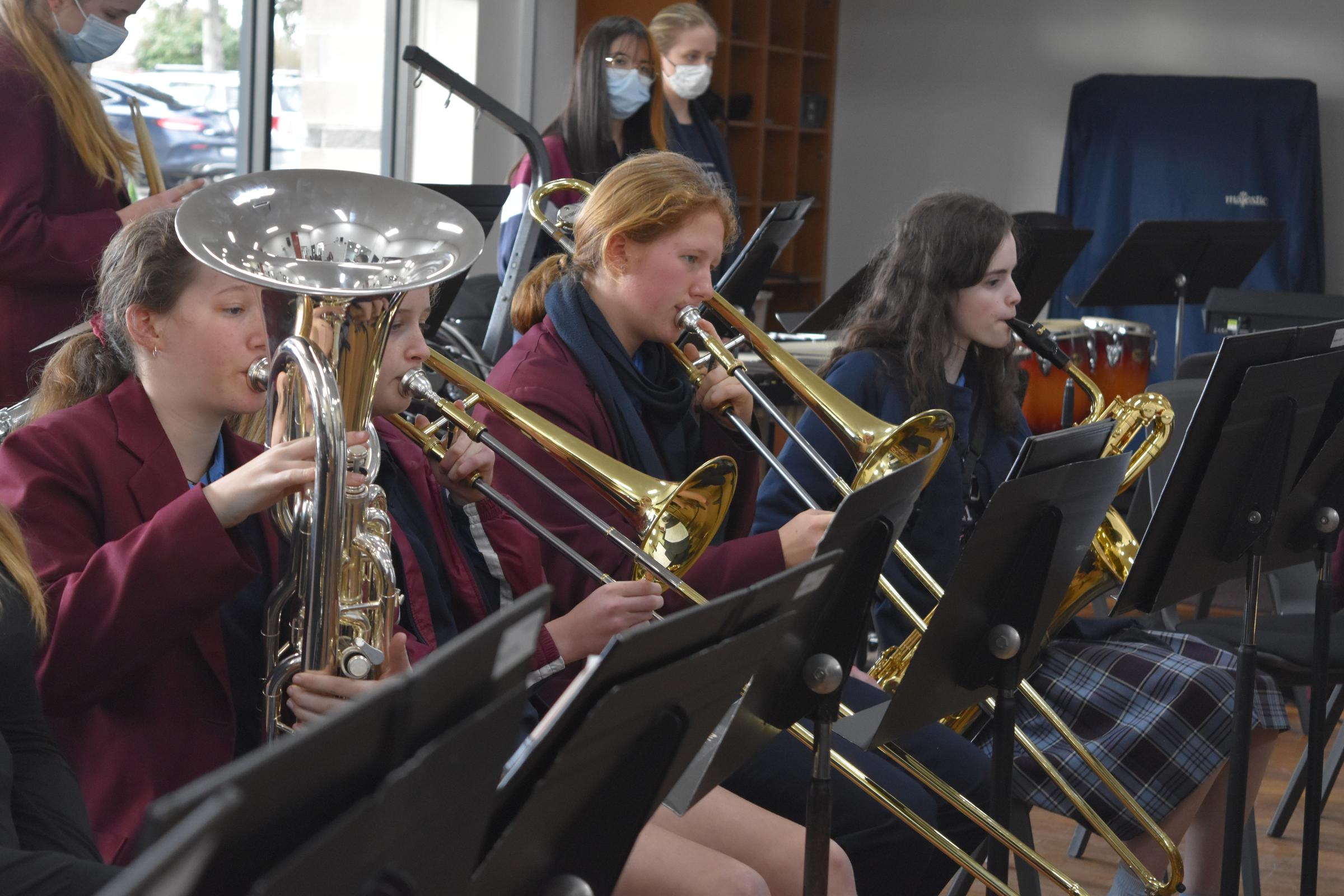Music

There are no prerequisites for entry to Units 1, 2 and 3. All instruments are possible, including digital. There is no barrier to those who are learning an instrument for the first time.
Units 1 & 2: Music
These units focus on enhancing performance on the student’s instrument(s) of choice while working on theory and aural skills to improve musicianship.
- Performing - Students develop their individual instrumental and musicianship skills through practice, rehearsal and performance.
- Creating - Students create a folio of creative responses. They arrange, compose or improvise short music exercises that reflect their understanding of music and the processes they have studied.
- Analysing and Responding - Students develop knowledge of music language concepts as they analyse and respond to a range of music, becoming familiar with the ways music creators treat elements of music and concepts and use compositional devices to create works that communicate their ideas.
On completing these units students should be able to:
- Rehearse and present planned performances using technical control, expression and stylistic understanding in at least two works (solo or ensemble), which demonstrate knowledge drawn from their investigation of music organisation.
- Create short music works/responses that demonstrate their understanding of different approaches to musical organisation, and reflect on the creative process.
- Describe how music is organised in at least two music examples, responding to music characteristics in a range of music excerpts and identifying how music is organised, and identifying, recreating and documenting music language concepts presented in context and in isolation.
Selecting a study for Unit 3 & 4 Music
We will be offering 3 units in Unit 3 and 4 Music The main differences between the units are:
- Music Repertoire Performance involves learning pieces of music from musical notation and performing them the way that the composers’ intended.
- Music Contemporary Performance involves learning pieces of music primarily from recordings and allows students to have more of a personal interpretation of their music.
- Music Inquiry is more targeted towards the personal interests of the student, which can involve a combination of performing, composing/arranging and investigating music. Students choose their own Area of Investigation which may be a style, a performer, a creator or a musical genre.
Units 3 & 4: Music Repertoire Performance
These units focus on enhancing performance on the student’s instrument(s) of choice while working on theory and aural skills to improve musicianship.
- Performing - Students develop a performance program that includes consideration of the historical performance practices and interpretative traditions that inform the styles represented in their programs.
- Analysing for Performance - Students analyse and present technical, expressive and stylistic challenges relevant to the pieces in their performance program.
- Responding - Music theory, aural skills and the analysis of interpretive decisions made by performers and composers in pre-recorded works.
On completing these units students should be able to:
- Perform a final recital of up to 20 minutes’ duration, demonstrating a diverse range of techniques and expressive qualities reflecting an understanding of a range of music styles and performance conventions.
- Demonstrate and discuss techniques (technical and expressive) relevant to the performance and development of a personal interpretation of works selected for performance.
- Discuss the interpretation of expressive elements of music in pre-recorded works.
- Develop their auditory discrimination and memory skills through identifying, re-creating and notating short examples.
Units 3 & 4: Music Contemporary Performance
These units focus on enhancing performance on the student’s instrument(s) of choice while working on theory and aural skills to improve musicianship.
- Performing - Students develop a performance program based on the study of the work of other performers and their approaches to interpretation in performing musical works.
- Analysing for Performance - Students develop strategies to address the technical, expressive and stylistic challenges relevant to works they are preparing for performance.
- Responding - Music theory, aural skills and the analysis of interpretive decisions made by performers and composers in pre-recorded contemporary works.
On completing these units students should be able to:
- Perform a program of works, including one work demonstrating a creative reimagining of an existing work, relevant to the performer’s Statement of Intention.
- Demonstrate and discuss performance development techniques and reimagining approaches relevant to performance of selected works.
- Discuss a performer’s interpretation and manipulation of music elements and concepts in works, identifying and transcribing short examples of music using appropriate notation.
Units 3 & 4: Music Inquiry
In this unit, through music making and responding, students focus on connections between music created in different times and/or places and the influence(s) of one on the other. Their music making involves the integrated music experiences of performing, creating and responding. They compose, arrange, interpret, reimagine, improvise, recreate, perform and critique music in a scaffold manner that will lead to their project in Unit 4, where students become increasingly autonomous and self-directed and less dependent on teacher direction and support.
- Music making - Students focus on performing, using any instrument(s) or sound source(s), and composing/arranging music connected with a selected music style and/or creator.
- Analysing for music making - Students focus on at least two music works from different times and/or locations, investigating how the creator’s treatment of music elements, concepts and compositional devices in one work may influence another work.
- Responding - Students analyse music from a range of sources across time and place, comparing their musical characteristics and exploring the influence that works have had on subsequent musical creators. They look at the treatment of musical elements, concepts and compositional devices together with contextual influences.
On completing these units students should be able to:
- Analyse and describe the treatment of music elements, concepts and compositional devices in two works from their Area of Investigation, and reflect on how these works have influenced their own music making.
- Perform/create/arrange works using instruments or sound sources and explain how their performance/composition/arrangement has been influenced by their selected music style and/or creator.
- Identify, describe and discuss musical characteristics of selected music excerpts and compare similarities and differences between them.

